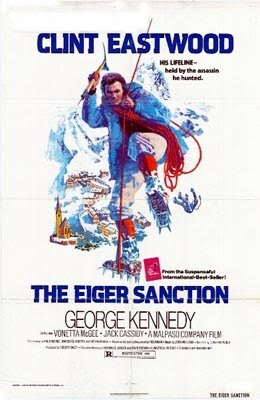
THE EIGER SANCTION
US, 1975, 125 minutes, Colour.
Clint Eastwood, George Kennedy, Vonetta Mc Gee, Jack Cassidy, Thayer David.
Directed by Clint Eastwood.
'Sanction' is a euphemism for retaliation assassinations. Clint Eastwood plays an art-connoisseur assassin in his usual fashion and directs this thriller which is sometimes exciting, sometimes predictable and sometimes leaves a nasty taste with its picture of CIA-type spying and cruel 'justice', and a bizarre agency control, an albino called 'Dragon' who lives only in an artificially red-lit office. There is a lot of mountain climbing (Arizona for practice, the Eiger for climax) which is frequently spectacular and alarming for audiences who dread vertigo. George Kennedy offers Eastwood garrulously vigorous support. You will probably guess whom Eastwood is pursuing before the flat and morally ambiguous ending.
1. The significance of the title? 'Sanction' as a euphemism for assassination? The significance of the "Eiger" for this kind of thriller?
2. Was this a good thriller? Its use of thriller conventions, especially in the opening? The murder thriller and the mystery? The nature of the villains and their not being known? The hero and the chase? Did the film use the conventions well or just ordinarily?
3. The background of C.I.A., politics, governments, corruptions, assassinations and justice? Audience response to this espionage world with its own laws and justice?
4. Can audiences understand this kind of paid assassin? The morality of his life, his need to be involved in such work, his conscience and the murders, understanding them as sanctions, his administration of the law and justice, criteria for right and wrong, taking orders, the greed for money? what motivated Hemlock to be involved in these assassinations? Audience response to his killing the man in Zurich? His quest to kill the other man on the Eiger?
5. How convincing was the art background of the film? Hemlock as a professor of art? His relationship with the students, his capacity for study, his hoarding of paintings? How did this tie in with his role as an assassin? Even as a retired assassin?
6. Comment on the tone of the film, its atmosphere of murder, the clashing of murder with the world of art? Dragon's methods in summoning Hemlock, the interview and the payment, Dragon's place of transacting business? what did this add to the film?
7. How important was the contribution of the locations: the initial Zurich locations, American University, Arizona, the mountains, the Eiger? What did they contribute by way of atmosphere and mood?
8. How complex a character was Hemlock? Clint Eastwood's style, could audience identify with him? How villainous was he? His art, greed, retirement? His arrogance, violence? Relationship with Dragon? Motivations, greed and lust, manipulating and able to be manipulated? A man of energy and wishing to kill? The values that determined whom he should kill? Were there any characteristics in his favour? His capacity for surviving? His awareness of the truth? The nature of the ending and his going scot-free? What kind of people are the Hemlocks of this world?
9. How did he contrast with his friend? The irony that the friend was the man whom he was seeking? The garrulous chatter, the help with Miles etc., the training programmes, the travel to Switzerland, the final rescue, the truth?
10. The characters of Jemima, George? The ambiguities of their role in life, the film? Espionnage, drugs, assassinassions? The credibility of the marriage with Jemima at the end?
11. The presentation of Dragon (his name?) as the villain: the visual presentation, living in a hellish red light, a devil figure? Hope and his evil? The nature of this evil compared with Hemlock's?
12. Miles as a villain? The campy style, the smooth operator? The 'he man' in trying to get him to assassinate Hemlock? The ugliness of Miles being left to die? Audience response to this?
13. The mystery of the climbers? Characters in themselves? The Frenchman, aging, and his wife? The arrogant German? The energetic and enthusiastic Austrian? Whom did audiences suspect as the villain? The enterprise in climbing the Eiger? Their collaboration and the risks? The inevitability of their deaths? How necessary? The irony of Dragon's thinking that the villain was killed?
14. How important was the physical nature of the film? Long sequences of training, the running, the exercises, the fights, the climbing in Arizona? The chases and Miles' death? The climbing of the Eiger and the vivid presentation of the risks etc.? How well photographed?
15. Themes of life and death in a modern day moral world? The individual and society? Private and public justice?